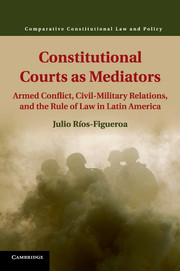 Constitutional Courts as Mediators
Constitutional Courts as Mediators Book contents
- Frontmatter
- Dedication
- Contents
- List of Figures
- List of Tables
- Acknowledgments
- 1 Constitutional Courts and the Armed Forces
- 2 A Theory of Constitutional Courts as Mediators
- 3 Constitutional Jurisprudence on Military Autonomy in Colombia, 1958–2013
- 4 Constitutional Jurisprudence on Military Autonomy in Peru, 1979–2013
- 5 Constitutional Jurisprudence on Military Autonomy in Mexico, 1917–2013
- 6 Judicial Regulation of the Use of Force in Colombia, Peru, and Mexico
- 7 Constitutional Courts as Mediators beyond Latin America
- 8 Constitutional Courts and Democratic Confl ict Solving
- References
- Index
6 - Judicial Regulation of the Use of Force in Colombia, Peru, and Mexico
Published online by Cambridge University Press: 05 May 2016
- Frontmatter
- Dedication
- Contents
- List of Figures
- List of Tables
- Acknowledgments
- 1 Constitutional Courts and the Armed Forces
- 2 A Theory of Constitutional Courts as Mediators
- 3 Constitutional Jurisprudence on Military Autonomy in Colombia, 1958–2013
- 4 Constitutional Jurisprudence on Military Autonomy in Peru, 1979–2013
- 5 Constitutional Jurisprudence on Military Autonomy in Mexico, 1917–2013
- 6 Judicial Regulation of the Use of Force in Colombia, Peru, and Mexico
- 7 Constitutional Courts as Mediators beyond Latin America
- 8 Constitutional Courts and Democratic Confl ict Solving
- References
- Index
Summary
In this kind of situation, more than facing an enemy, what you are actually doing is trying to re-establish the rule of law. You want to win the battle of governance, you want to show that you are the legitimate authority…. Accordingly, the use of force has to match that goal
Sergio Jaramillo Caro, Vice Minister of Defense in Colombia, 2006–9 (cited in Pfanner, Melzer, and Gibson 2008, 825)Bringing in the armed forces to face an internal security crisis in democratic countries implies many challenges. Soldiers, who are traditionally trained to fight wars and to engage in conventional combat against another country's armed forces, are called on to fight among fellow citizens against armed groups that do not resemble a regular army. Moreover, the armed forces, which are traditionally conceived of as a proactive force whose aim is to defeat an external enemy in a war, are called upon to perform as both a proactive and a preventive force whose aim is to restore security and the legitimate authority of the state. As the epigraph implies, when dealing with an internal security crisis how the armed forces prevail is as important as the fact that they do prevail. In a nutshell, the armed forces have to operate effectively in their internal security missions, but they also have to perform within the bounds of the democratic rule of law.
But it is not evident prima facie what the appropriate law governing these uncommon situations is and how balancing the clashing aims of addressing the threat to security while restoring legitimacy and the rule of law should be achieved. This comes down to how the use of force is regulated and who is in charge of doing so. Several questions arise: When the civilian government calls the armed forces in to face an internal security challenge, is the regular criminal law the appropriate framework for regulating the consequences of how lethal force is used? Alternatively, is the traditional law of war – the International Humanitarian Law (IHL) – a more appropriate framework? What are the legal consequences of using each legal framework – for the soldiers, the government, the regular citizens, the victims, and the armed groups challenging the forces of the state?
- Type
- Chapter
- Information
- Constitutional Courts as MediatorsArmed Conflict, Civil-Military Relations, and the Rule of Law in Latin America, pp. 151 - 177Publisher: Cambridge University PressPrint publication year: 2016
